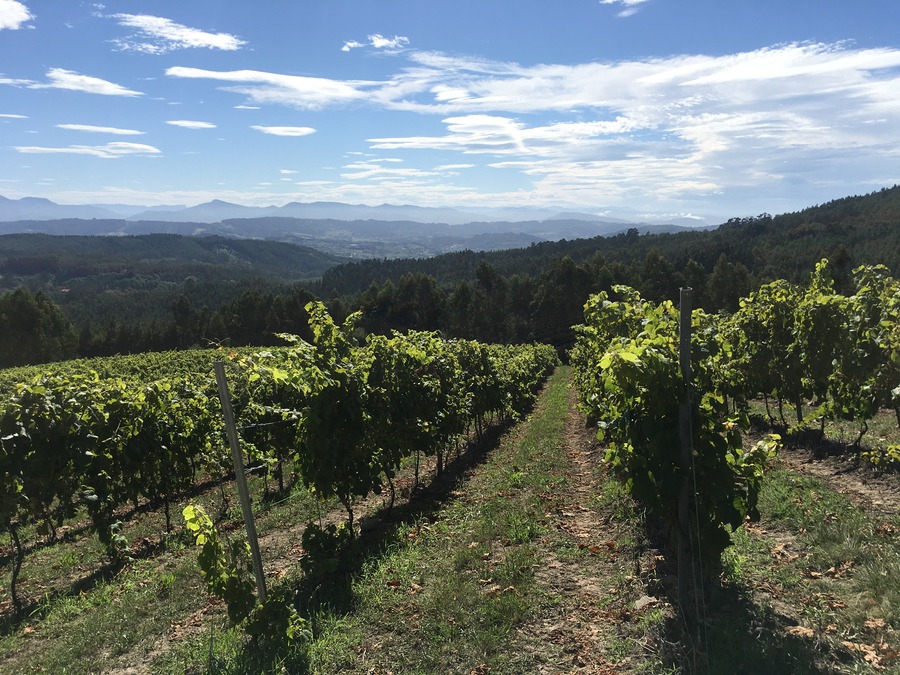Doniene Gorrondona
Bentalde Auzoa, 1. 48130 Bakio (Bizkaia)
www.donienegorrondona.com
A relatively veteran producer, the Gorrondona brand dates from the 1970s, but the current business was set up in the early 1990s after four partners with complementary skills bought this winery in Bakio, on the Basque coast. Their goal was to boost the local wines, poorly considered at the time. These were the early stages of modern txakoli, helped by the Department of Agriculture of the Basque Government and the creation of the DO Bizkaiko Txakolina in 1994.
The team includes agronomist Julen Frías, who looks after the vineyard, oenologist Itziar Insausti, her brother Egoitz, who studied chemistry and takes care of the vineyards and winemaking, and journalist Andoni Sarratea who was in charge of sales and marketing and is not involved in Gorrondona any more.
In Basque, Doniene means Saint John –the patron saint of Bakio, whose shrine crowns the summit of the beautiful San Juan de Gaztelugatxe islet nearby–, while Gorrondona is the name of the farmhouse/winery dating from 1852. Unusually for the area, there is a distillery producing white and herbs aguardiente (as it is traditional in Galicia) as well as a seaweed eau de vie. Another rarity is the sparkling wine Apardune (1,600 bottles, €26) made in the traditional method with the local white grape Hondarrabi Zuri plus a little amount of Folle Blanche.
Doniene Gorrondona grows 14Ha in the village of Bakio, seven of which come from new plantings, but they also buy grapes across the province of Bizkaia. “Buying grapes is complicated because professional winegrowers don’t exist. Grape growers are also wine producers,” they say. “ For the time being, the region’s high humidity levels prevent them from being organic.
They are great advocates of local grapes, notably Hondarrabi Zuri and Hondarrabi Beltza (zuri means white in Basque; beltza is red). With its thin skin and low alcohol, Folle Blanche represents a very small part and it is gradually being replaced. Doniene’s closeness to the sea helps to have those briny and iodine notes in the wines, they reckon. Grapes for Gorrondona’s premium wines are exclusively sourced from Bakio, a village which according to the team is “the cradle and benchmark of txakoli.”
White and red txakoli
Production stands around 100,000 bottles, 25% of which goes abroad, particularly to the US (De Maison Selections is their importer). Gorrondona (70,000 bottles, €12) is their entry-level txakoli, a blend of Hondarrabi Zuri with small quantities of Hondarrabi Beltza made as a blanc the noirs and Folle Blanche (Mune Mahatza). One step above, Doniene (€16, 20,000 bottles) is made from 100% Hondarrabi Zuri; it is a textbook txakoli proving how consistent Hondarrabi Zuri maintaining its distinctive acidity. Almost the same wine but with grapes grown only in Bakio is used for Ondarea (€22, 10,000 bottles), a barrel-fermented white aged with its lees during four more months. There’s also a limited edition txakoli (a few hundred bottles are made) called Doniene XX which is aged for seven months.
Perhaps the most striking wine is the red Gorrondona (4,000 bottles, €75), a 100% Hondarrabi Beltza made with grapes grown in Bakio with a wild, rustic character and not a trace of astringency. Fruit-driven and peppery, it reminds of Cabernet Franc, to whom it is related. Apparently, the wine is a result of the winemaker’s stubbornness —she has been making it for 20 years but only saw a leap forward after selecting indigenous yeasts in the 2014 vintage.
The last addition to the range is Iri (around 2,000 bottles, €19), their first single-vineyard wine. Grapes are sourced from Iri Mingorrieta, a 8.5Ha vineyard with five of them under vine. Located on the mountain at an elevation of 250m, it is an area with poor soils and no previous grape growing tradition. Given the natural low yields, grapes are ripe and concentrated without losing the area’s traditional acidity. The wine undergoes spontaneous fermentation and is aged under lees in stainless steel tanks. No sulphites are added.
There is also a new Hondarrabi Beltza starting in the 2019 vintage. Called Ho-Be (it means “better” in Basque and it stands for the variety's initials), the wine is aged four months in oak, but spends one year in stainless steel tanks and another one in bottle. This helps to nuance the wild side of the variety and soften its texture.
Most popular
NEWSLETTER
Join our community of Spanish wine lovers


